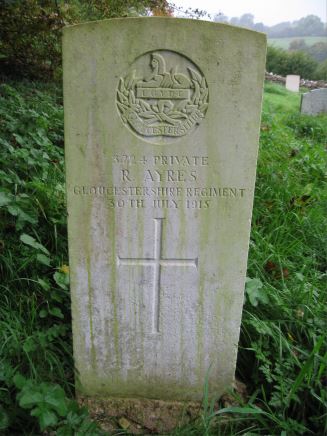1/5th Battalion, Gloucestershire Regiment

Richard Ayres was born at Frampton Mansell, Gloucestershire in 1864. He was baptised on 11 September 1864. He was the son of William (an agricultural labourer) and Martha Ayres. They died in 1896 and 1903 respectively. At the time of the 1871 Census the couple had five children.
In 1889 Richard married Mary Ann Jones in Stroud and in December of that year their first child, a daughter, Amelia Maud, arrived and she was followed by John in 1892 and Arthur Jesse in 1894. The 1911 Census indicates that there was another child, who had died before that census was taken. When the census was taken the family (except Amelia) was living at Star Lane, Avening and Richard’s occupation was described as a ‘tree feller’. Amelia had married Albert Harry Cuff by this time and he served as a Private (7683) with the 7th Battalion, Gloucestershire Regiment during the Great War and died on 29 August 1916, in Mesopotamia: he has no known grave and is
commemorated on the Basra Memorial, Iraq.
In 1905 Richard had fallen upon hard times and spent the period 17 October to 16 December in Gloucester Gaol as a debtor. Prison records indicate release was twelve days earlier than his sentence, the debt having been paid.
Unfortunately no record of Richard’s Army service has survived. However, the Register of Soldiers’ Effects does record that he was serving with No 2 Support Company of the 1/5th Glosters (a Territorial Force battalion). A newspaper report also makes mention of service in the National Reserve. Richard would have been about 50 when the Great War started in August 1914 and it seems likely that he had some degree of military service and was called up, rather than being a ‘Kitchener Volunteer’; his low Army number also gives credence to this.
How Richard came to meet his death was fully reported in The Hampshire Advertiser of 7 August 1915 and the Portsmouth Evening News of 2 August. Both give details of an Inquest held at the Rifle Depot, Winchester.
On 30 July 1915, at 11.28pm, Private Ayres, of 5th Glosters (National Reserve) was one of a party of four involved in changing the guard and exchanging ammunition near to the St Cross Signal Box, on the London & South Western Railway line, between Eastleigh and Winchester. A light engine came along the track heading for Eastleigh. Its approach was not spotted by the guard changing party, until it was about 10 yards away. Ayres was standing on a sleeper nearest the line: a comrade shouted ‘Jump Dick’ but it was too late. The locomotive struck Ayres in the back and hurled him to the side of the line. He suffered a fractured spine, four broken ribs and head injuries; death was almost certainly instantaneous. However he was taken by motor vehicle to the military hospital but was found to be dead on arrival; he was 51 years old. A verdict of accidental death was recorded. His wife was unable to attend the inquest, as she had two sons in the Army (presumably John and Arthur, one of whom was stated to be dangerously wounded – it would appear he survived).
Richard Ayres’ body was brought back to Avening for burial, in the churchyard of Holy Cross Church. His grave is now marked by a standard CWGC headstone. Original CWGC burial records state that he was ‘buried with wife’ but there is no reference to this fact on the headstone and it has not proved possible to ascertain when she died. He is commemorated on the 1914-18 War Memorial tablet inside Avening Church.
Researched by Graham Adams 12 April 2017
